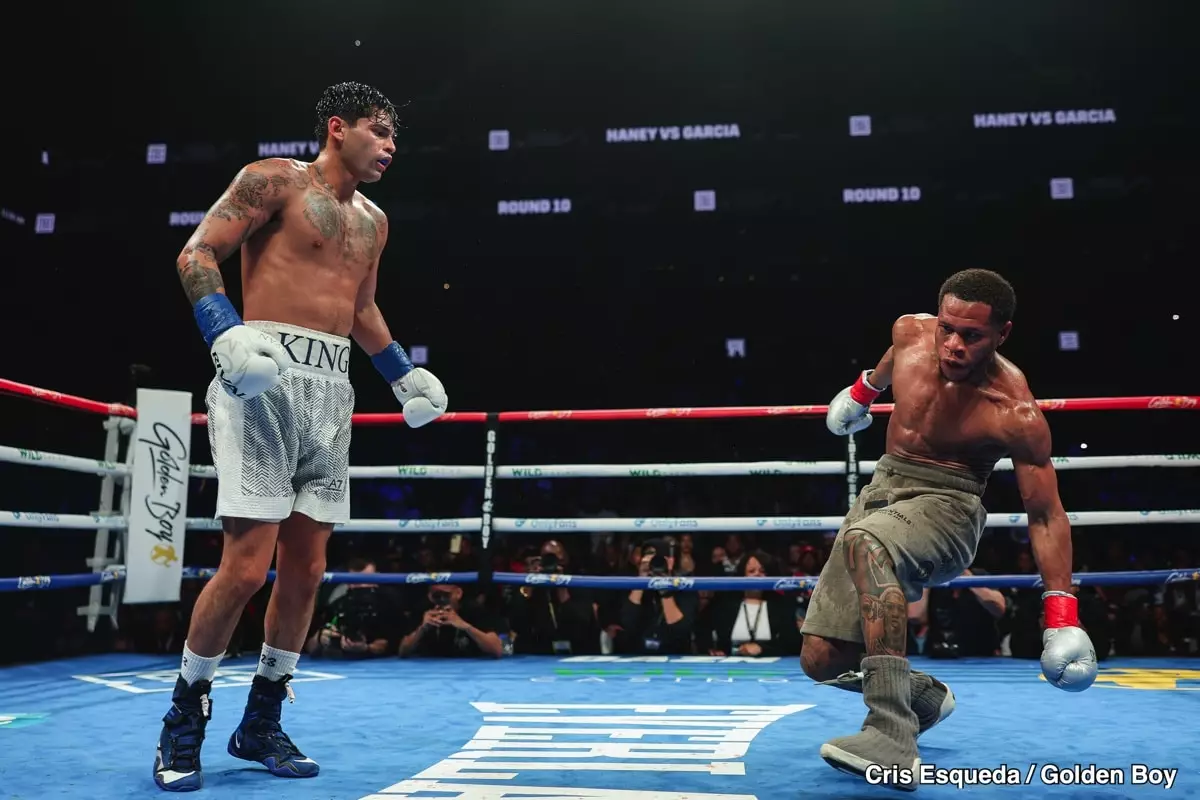In the aftermath of Ryan Garcia’s victory over Devin Haney last April, the boxing community has been abuzz with speculation and fervor regarding the potential for a rematch. Promoter Oscar De La Hoya, a seasoned figure in the sport, has explicitly weighed in on the matter, suggesting that a second showdown between these two boxers may not materialize, particularly as we look ahead toward 2025. This raises critical questions about Haney’s future in the ring and his mental state following what many consider a significant setback in his career.
De La Hoya’s assessment of Haney as a “shot fighter” underscores a broader narrative that has emerged since the bout. Observers noted Haney’s instability during the match itself, marked by multiple knockdowns that not only shook his physical prowess but seemingly fractured his mental fortress. The perception of Haney being “washed up,” both physically and mentally, is not a notion held solely by De La Hoya; a chorus of fans and analysts have echoed similar sentiments. The manner in which Haney handled his defeat—expressing little eagerness to return to the ring—suggests a lingering emotional toll that could have lasting implications on his career trajectory.
Among the most contentious points in this discussion is Haney’s recent decision to file a lawsuit against Garcia for battery, fraud, and unjust enrichment. To some, this move signals defeat rather than determination. How does one pursue legal action against an opponent who overwhelmingly bested them in the ring? This paradoxical approach seems to contradict the ethos of a fighter seeking redemption through performance. It raises the crucial question of self-belief: has Haney indeed lost his confidence, leading him to resort to legal recourse instead of striving for a rematch in the ring?
De La Hoya’s comments on the lawsuit emphasize what many see as a misstep on Haney’s part. He provocatively questioned the rationale behind suing an opponent who had evidently bested him, framing such actions as “noise.” This characterization captures the frustration felt by many in the boxing community, who see depth in a fighter’s ability to overcome adversity with tenacity and grit rather than legal battles. While the lawsuit might have been driven by emotion—possibly even influenced by Haney’s father, Bill Haney—it represents a departure from the traditional fighter’s response to defeat.
On the other side of the ring, Oscar De La Hoya expresses a much more optimistic outlook for Ryan Garcia. Having met with Garcia recently, De La Hoya is optimistic about his comeback plans, noting that Garcia is “in great spirits” and focusing on his training. Here, we see a stark contrast in the trajectories of the two fighters: Garcia’s forward momentum suggests resilience, while Haney’s plight reflects uncertainty.
De La Hoya’s impressive record and storied career provide context for his belief in Garcia’s potential for growth post-defeat. He advocates for Garcia’s return to the gym and acknowledges the importance of understanding past experiences as a foundation for future success. This mentorship aspect, where De La Hoya draws upon his own journey through trials, serves as a vital reinforcer for Garcia, who stands poised to thrive in the wake of his victory, rather than languish in nostalgia.
As we navigate the complexities surrounding Garcia and Haney, speculation about a possible rematch looms large but increasingly appears improbable. Haney’s legal actions may signify a halt in his aspirations for immediate redemption, while Garcia’s focus on training and improvement propels him forward. The most striking takeaway from De La Hoya’s insights is the necessity of a fighter’s willingness to adapt and evolve after setbacks.
The boxing landscape is always shifting, and while Haney may still harbor hopes for a rematch, the reality remains that such opportunities do not always align with personal desires. For now, Garcia’s trajectory seems brighter, fueled by a commitment to his craft. As fans, we are left questioning the mental resilience and future prospects of fighters who encounter not just opponents but also their own limitations in the unforgiving arena of professional boxing.

